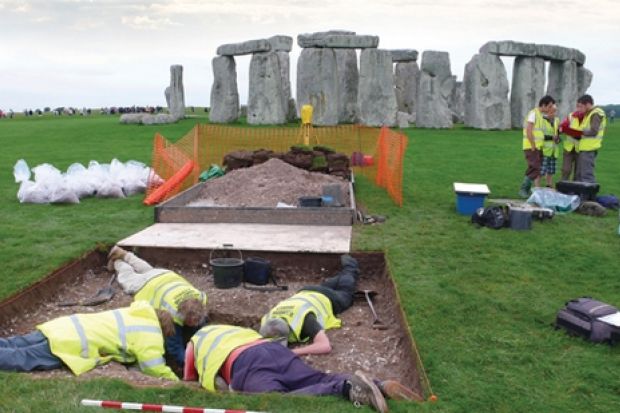As head of the Arts and Humanities Research Council, Rick Rylance said he sometimes felt caught between the government and the academy.
"It is the same in academia: your head of department is eager for you to do more research, but your students want you to give more time to them," he said in an interview with Times Higher Education. "You are always in that negotiation situation, and just occasionally you feel that you can't satisfy both (parties)."
Professor Rylance has certainly felt the heat from academics of late, coming under huge pressure to remove references to the "Big Society" from the AHRC's latest Delivery Plan. He has been accused of pandering to party political slogans and of allowing the government to dictate research priorities.
But he insisted that terms such as "dictation" did not capture the reality of the "iterative" discussions that progress over several months around each Comprehensive Spending Review.
"The government says: 'We think X is really urgent,'?" he explained. "You sit down and think: 'Is that something to do with us?' I don't get emails from anyone (in the government) saying: 'You must do this.'?"
He said it was open to each research council to explain why it should not fund a particular "policy bee" in the government's bonnet: perhaps because the subject was already being researched elsewhere, or because officials had "misunderstood the problem".
"Occasionally they will be unhappy with your response, but that is life. It doesn't mean you have to say, forelock tugged, 'That is what we'll do,'" he said, adding that the typical resolution involved a compromise.
"The government knows that if it (dictated research), what it would get is rubbish," he added.
Professor Rylance said his critics were wrong to assume that funding research into a policy area was the same thing as supporting it: AHRC-funded research into the Big Society would be "independent-minded people doing independent-minded research on a topic that is of lively interest to us all".
He also said that if research councils avoided funding work in areas where the government had policies, there would be little left to study. "You choose the most prominent and, from a research point of view, promising topics and set people to work on those."
Mutual advantage
He admitted that there was a "real issue" about how, in an era of "very serious change" in research, "we are going to protect the integrity of research and give due acknowledgement to its public responsibilities".
But he added that the impact agenda was "here to stay" and the question was how to implement it "to the advantage both of the research community and those who want proof of the productive use of public money".
One new programme that he hopes will have a big impact is the Creative Economy Hubs to which all of the AHRC's funding for knowledge transfer will be redirected.
The hubs will involve research organisations forming partnerships of equals with public- and private- sector bodies to "create knowledge and research" relevant to particular areas of the creative economy.
However, Professor Rylance admitted that the council was still feeling its way and had deliberately avoided being prescriptive in its call for expressions of interest - about 50 of which were received by last month's deadline.
"I don't feel any degree of confidence that I understand (the issues) clearly enough to say: 'You must do this,'?" he said, adding that the council would enlist external advice to assess applications and help bidders develop promising ones into full business plans, funding for which will be decided in the autumn.
Professor Rylance said he envisaged asking successful partnerships to undertake a national coordination function, promoting the sharing of good ideas and the expansion of networks. Stating that collaboration was the key recurring theme in the Delivery Plan, he said it was this, rather than an overt research-concentration agenda, that lay behind the AHRC's decision to fund fewer, larger projects over longer periods.
He pointed out that about 70 per cent of AHRC funding already went to just 30 institutions. The issue for him was how to support pockets of excellence elsewhere while making efficiencies to offset the real-terms cuts to the AHRC's budget.
Other aspirations behind the move include giving more autonomy to institutions over spending and promoting cross-institutional and disciplinary "synergy" - although he added that the research councils needed to have a "joined-up conversation on what interdisciplinary means and why it thrives on some occasions and fails on others".
He also pointed out that supporting individual projects would remain the second-biggest draw on the AHRC budget, while much of the quality-related budget, which funds about 80 per cent of humanities research, also went on individual support.
The idea that the AHRC Delivery Plan is the "death certificate" for individual research is a misreading and a misunderstanding of the way arts and humanities research is funded, he said.
Register to continue
Why register?
- Registration is free and only takes a moment
- Once registered, you can read 3 articles a month
- Sign up for our newsletter
Subscribe
Or subscribe for unlimited access to:
- Unlimited access to news, views, insights & reviews
- Digital editions
- Digital access to THE’s university and college rankings analysis
Already registered or a current subscriber? Login
